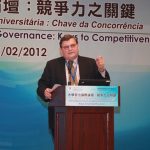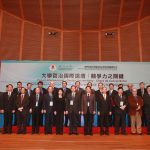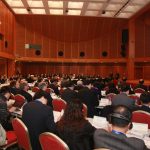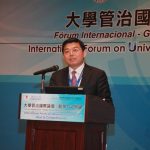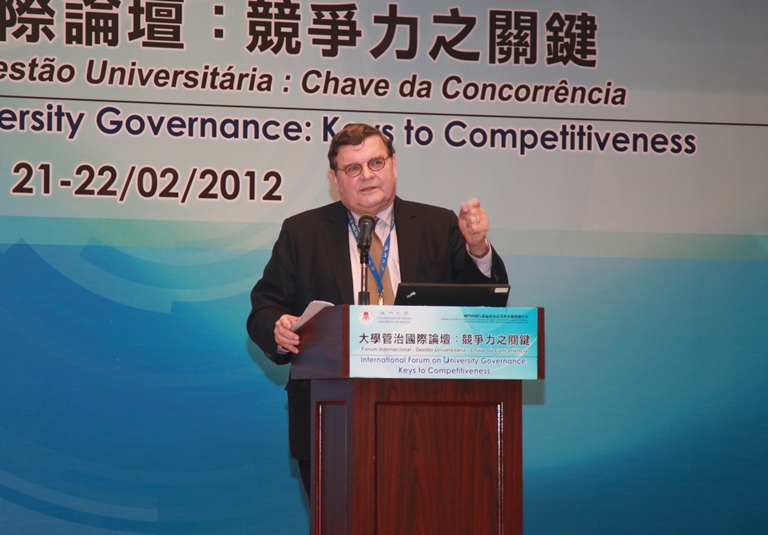
Today (21 February 2012), the 2-day International Forum on University Governance: Keys to Competitiveness, co-organized by the University of Macau (UM) and the Tertiary Education Services Office of Macao SAR, kicked off at the Macao Science Centre. Experts from around the world attended the forum and had in-depth discussions on a range of issues, including university governance, autonomy, accountability and strategic planning. The purpose of the forum is to help the Macao SAR government contemplate the issue of university governance so as to enhance UM's international competitiveness and find a suitable governance model that can better support the future development of UM and higher education in Macao. Officiating guests at the opening ceremony included Secretary for Social Affairs and Culture of Macao SAR Mr. Cheong U; Director-General of the Department of International Cooperation and Exchanges and Director of the Office for Hong Kong, Macao and Taiwan Affairs, Ministry of Education, PRC, Ms. Zhang Xiuqin; Director of the Department of Education and Culture, Liaison Office of the Central People's Government in Macao SAR, Mr. Liu Xiaohang; UM's University Council Chair and UM Charter Revision Task Force Chair Dr. Tse Chi Wai; Director of the Tertiary Education Services Office of Macao SAR Mr. Sou Chio Fai; UM Rector Wei Zhao; and Consul General of Portugal in Macao & Hong Kong Dr. Manuel Carvalho. Government officials of higher education (HE), university heads and council members, and senior HE scholars and management personnel from mainland China, Hong Kong, Taiwan, South Korea, Singapore, Portugal, Austria and North America, as well as local government officials, members of the local Executive Council, members of the local Legislative Assembly, members of UM Charter Revision Task Force, members of UM's University Assembly and University Council, and representatives from local tertiary institutions and other educational institutions also attended the forum. In his speech, Dr. Tse Chi Wai noted that higher education is becoming increasingly globalized, and so is competition; only those universities with sufficient flexibility can develop their innate strengths and potential to the fullest extent, maintain their local competitiveness, and nurture graduates with international competitiveness. He added that while granting necessary autonomy to universities, a well-defined legal framework within which universities define their conduct of operation should be established to safeguard the interests of the societies from which universities derive their support, and that mechanisms of accountability must be visible for public scrutiny. He said that UM needs the valuable experience of international experts and government officials in helping it to carry out reforms based on Macao's local conditions and also needs their assistance in overcoming the inevitable difficulties in the process. Director-General of the Department of International Cooperation and Exchanges and Director of the Office for Hong Kong, Macao and Taiwan Affairs, Ministry of Education, PRC, Ms. Zhang Xiuqin said in her speech that since Macao's return to the motherland, it has attained impressive achievements in higher education, which are mainly reflected in the constant improvement in scope and quality. She said this has led to the supply of a large number of professionals for the economic and social development of Macao. She added that UM is the most influential university in Macao and follows the traditional value of "humanity, integrity, propriety, wisdom and sincerity", with a goal of becoming a world-class institution. She pledged full support from the Ministry of Education of PRC for UM and higher education development in Macao. UM Rector Wei Zhao pointed out three reasons why Macao needs to "elevate its higher education system". "Being the flagship university, our mission is to nurture top-notched talents, and as we have said, we hope that the future Chief Executives of Macao will be one of our graduates. This is the first reason why we need to elevate the higher education system of Macao." said Rector Zhao. "The second reason is to meet the expectation of China and explore a road to the enhancement of higher education for China. The third reason is that nowadays, we notice that there is an universal trend on higher education reform. Macao should not be marginalised in this upgrading process. We should be riding on the crest of the world trend to catch up from behind." He further pointed out that elevating UM takes a long time and in the process difficulties and challenges are inevitable, and different stages require different governance models to enhance its competitiveness, and therefore UM "needs more new ideas, directions and strategies to be prepared for new changes that will help us blaze a new trail for the future development of the university". Director of the Tertiary Education Services Office of Macao SAR Mr. Sou Chio Fai said in his speech: "With a vision to become a world-class university, the University of Macao has established a Charter Revision Task Force to study the revision of the university's legal regime and charter. Meanwhile, the Tertiary Education Services Office is amending the higher education system as we believe that a world-class education system can contribute to the building of world-class higher education institutions." Prof. Wang Zhenmin, dean of the Faculty of Law at Tsinghua University, Beijing, and also one of the keynote speakers, said that experiences of many successful universities have shown that whether or not a university has an independent legal status determines its development, and without an independent legal status, it would be very difficult for a university to become a top institution that can lead society's development. He said that for UM to achieve the goal of becoming a world-class university, it must be granted sufficient autonomy. He added that the relationship between the government and a university should be like the relationship between an industry and commerce administration and a business, in which the administration only interferes when the business is suspected of breaking the law; similarly, the government should not unduly interfere with a university's internal affairs. When asked about how to manifest supervision and accountability, Prof. Wang responded that the government should only carry out post-audit instead of pre-approval. Another keynote speaker Prof. William Mobley, who is Emeritus President at Texas A & M University, U.S., said that a university must have sufficient flexibility and autonomy in order to enhance competitiveness and attract and retain the best people, but a proper balance should be sought between autonomy and accountability. He believes this forum can help UM study experiences from different places and have a greater impact on Macao and the world. This forum is one of a series of UM-organized academic events from January to March.
View gallery

